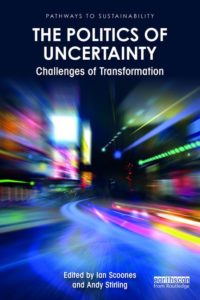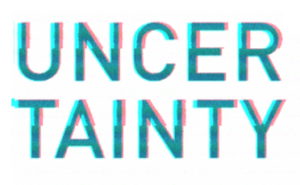- Published 15/07/20
Edited by Ian Scoones and Andy Stirling
Routledge, 2020
Open access
This book is available as an Open Access e-book. Individual chapters can also be downloaded free of charge.
Related Articles
COVID-19 and the Futility of Control in the Modern World
Andy Stirling and Ian Scoones, Issues in Science and Technology, 23 July 2020
Why uncertainty requires a new politics
Ian Scoones and Andy Stirling, OpenDemocracy, 3 August 2020
About the book
 Why is uncertainty so important to politics today? To explore the underlying reasons, issues and challenges, this book’s chapters address finance and banking, insurance, technology regulation and critical infrastructures, as well as climate change, infectious disease responses, natural disasters, migration, crime and security and spirituality and religion.
Why is uncertainty so important to politics today? To explore the underlying reasons, issues and challenges, this book’s chapters address finance and banking, insurance, technology regulation and critical infrastructures, as well as climate change, infectious disease responses, natural disasters, migration, crime and security and spirituality and religion.
The book argues that uncertainties must be understood as complex constructions of knowledge, materiality, experience, embodiment and practice. Examining in particular how uncertainties are experienced in contexts of marginalisation and precarity, this book shows how sustainability and development are not just technical issues, but depend deeply on political values and choices. What burgeoning uncertainties require lies less in escalating efforts at control, but more in a new – more collective, mutualistic and convivial – politics of responsibility and care. If hopes of much-needed progressive transformation are to be realised, then currently blinkered understandings of uncertainty need to be met with renewed democratic struggle.
Written in an accessible style and illustrated by multiple case studies from across the world, this book will appeal to a wide cross-disciplinary audience in fields ranging from economics to law to science studies to sociology to anthropology and geography, as well as professionals working in risk management, disaster risk reduction, emergencies and wider public policy fields.
This book is published in the STEPS Centre’s Pathways to Sustainability series.
Book chapters
- Chapter 1: Uncertainty and the Politics of Transformation (Ian Scoones and Andy Stirling)
- Chapter 2: The Assault of Financial Futures on the Rest of Time (Timo Walter and Leon Wansleben)
- Chapter 3: Sharing Risks or Proliferating Uncertainties? Insurance, Disaster and Development (Leigh Johnson)
- Chapter 4: The Unravelling of Technocratic Orthodoxy? Contemporary Knowledge Politics in Technology Regulation (Patrick van Zwanenberg)
- Chapter 5: Control, Manage or Cope? A Politics for Risks, Uncertainties and Unknown-Unknowns (Emery Roe)
- Chapter 6: Expanding Cities: Living, Planning and Governing Uncertainty (Matthew Cook, Federico Cugurullo, James Evans, Sobia Ahmad Kaker and Saska Petrova)
- Chapter 7: Uncertainty in Modelling Climate Change: The Possibilities of Co-production Through Knowledge Pluralism (Lyla Mehta and Shilpi Srivastava)
- Chapter 8: Disease Outbreaks: Navigating Uncertainties in Preparedness and Response (Hayley MacGregor, Santiago Ripoll and Melissa Leach)
- Chapter 9: Disasters, Humanitarianism and Emergencies: A Politics of Uncertainty (Mark Pelling, Detlef Mueller-Mahn and John McCloskey)
- Chapter 10: Intertwining the Politics of Uncertainty, Mobility and Immobility (Dorte Thorsen)
- Chapter 11: Disputing Security and Risk: The Convoluted Politics of Uncertainty (Helena Farrand Carrapico, Narzanin Massoumi, William McGowan and Gabe Mythen)
- Chapter 12: Unsettling the Apocalypse: Uncertainty in Spirituality and Religion (Nathan Oxley)
Reviews
“This collection fills an important gap in our understanding of the role of uncertainty in the science-society nexus. It illustrates the growing awareness that, in this context, uncertainty is essentially a political concern to be addressed by better governance rather than a scientific problem to be solved by improved techniques. Scientific uncertainty will continue to be a challenge for contemporary societies as long as the legitimacy of policy decision-making and action is based on trust in science.” – Professor Silvio Funtowicz, Centre for the Study of the Sciences and the Humanities, University of Bergen; formerly EU Joint Research Centre, Ispra
“What should we do with uncertainty? Not abolish it with facts, this wide-ranging essay collection argues. Introduced by two of our most incisive analysts of alternative social futures, the book delves into today’s most significant governance challenges and shows how uncertainty leads us to reimagine the politics of modernity. In these turbulent times, this is a book to read, savor and read again.” – Professor Sheila Jasanoff, Pforzheimer Professor of Science and Technology Studies at the Harvard Kennedy School
“The old world order is fading into history: what a new one will look like is currently uncertain. In fields as diverse as climate change, finance, urban futures, pandemics, mass migration and many more, the future looks less predictable and demands alternative approaches. This well-timed book lays out what they might be.” – Professor Dipak Gyawali, Academician, Academy of Science and Technology, Kathmandu; formerly Nepali Minister of Water Resources
“The Politics of Uncertainty questions the framing of uncertainty that has largely been transformed into calculable risks. Across a wide spectrum ranging from finance and banking to practices of modelling disease and climate change, the authors highlight the failings of institutions of illusionary control. Their urgent appeal deserves to be widely heard: by embracing uncertainty a culture of care can emerge, paving the way towards sustainability” – Emeritus Professor Dr. Helga Nowotny, Chair of the ERA Council Forum, Austria; former President of the European Research Council
“Our world is deeply uncertain. Yet the concept is barely understood. This extraordinary volume brings together a cross-disciplinary, international group of thinkers on the leading edge of thinking about incertitude. The book’s essays challenge us to recognize the unique risks and, more radically, the emancipatory opportunities associated with what can not be known or domesticated.” – Professor Ilene Grabel, Distinguished Professor of International Finance, Josef Korbel School of International Studies, University of Denver; author of multiple prize-winning book, ‘When Things Don’t Fall Apart’, MIT Press.
“That even the best of global scientific knowledge and attendant policy cultures are always beset with contingency and ignorance has been a long and unfinished learning struggle. That this recognition is vital for practical effect in the development of sustainable and just human democratic futures has seen even stronger resistance, or denial. This collection integrates leading insights on the diverse, evolving challenges presented by these persistent conditions – a truly unique resource.” – Emeritus Professor Brian Wynne, Centre for the Study of Environment Change, University of Lancaster; former special advisor to the House of Lords and Royal Society on science in society
“While risk and uncertainty are often described in technocratic ways that create fear or the feeling of being overwhelmed by complexity, the book offers us a new way to reimagine how society can engage with uncertainty in an open way that prioritises alternative visions, questions the sources of data and the direction of science, debates the distribution of benefits, and opens the possibility of participation and experimentation along the way. It could not come at a better time.” – Professor Mariana Mazzucato, Founding Director, Institute for Innovation and Public Purpose, University College London; winner of 2014 New Statesman SPERI Prize, 2015 Hans-Matthöfer-Preis and 2018 Leontief Prize
Resources on uncertainty
Symposium: The politics of UNcertainty
Our main event in 2019 was a symposium in July on ‘The Politics of Uncertainty: Practical Challenges for Transformative Action’. The event page includes video, blog posts and a podcast series.
Theme: Uncertainty
 Uncertainties can make it hard to plan ahead. But recognising them can help to reveal new questions and choices. What kinds of uncertainty are there, why do they matter for sustainability, and what ideas, approaches and methods can help us to respond to them?
Uncertainties can make it hard to plan ahead. But recognising them can help to reveal new questions and choices. What kinds of uncertainty are there, why do they matter for sustainability, and what ideas, approaches and methods can help us to respond to them?